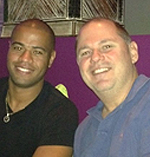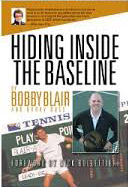Testing Pro Tennis
Bobby Blair and Barry Buss

After a successful sophomore college season, myself and hundreds of other hungry and capable college players spanned the globe to try our hands at the professional ranks. I remember the process of deciding where to go. These were the pre-Internet days.
We aspiring players would write to the USTA or the International Tennis Federation and get the schedules of futures and satellite events taking place all around the world. I would spend nights reading the schedules, looking at all the exotic places my tennis could take me.
My mom had been right. All the hard work and sacrifice had paid off. I would think about those trips we used to take to the Orlando Airport to watch the planes take off and her encouragement to work hard at my tennis so that someday I would be on one of those planes heading to a pro tournament.
But not ready to challenge myself with an exotic cosmopolitan culture, I played it safe and chose the Canadian satellite tour the summer of 1985. My grandmother lived just outside of Toronto, so I had a relative home base and security to go to if life on the road with my tennis brethren began to wear upon me.

The first event was in Kitchener, Ontario. Many players can spend a lifetime chasing their first ATP point and that elusive world ranking. I was fortunate and played super in my first event, qualifying and then winning the tournament, defeating my childhood junior idol Todd Witsken.
My first ATP point, my first world ranking and my first paycheck. I remember coming to my hotel room and counting out the money from the week. I won $1,350. It wasn't a lot, but it was more than I had ever had in my life.
Tennis players are a funny breed with money. Much of value is often just given to us. Many of my peers who went on to have successful professional careers took their first big paycheck and bought Porsches or BMW's.
I on the other hand had a different relationship with money. In my heart, that $1,350 was not really mine to spend. It belonged to all the people along my tennis path who gave to me and my tennis, firstly my mother.
So I drove to Thunder Beach, 70 miles outside of Toronto, to see my mom's mom, my grandmother Nana. I took her to lunch to celebrate. As exciting as it was to now have a world ranking and some money in my pocket from playing good tennis, the highlight of that week was being able to see the look of appreciation on my Nana's face as I picked her up, took her to lunch and picked up the check.

On the tour, the satellites is where it begins. But only those who go deep into tournaments are playing all week. There is practice, but also a lot of down time.
After my West Hollywood experience, I knew the larger cities had gay friendly neighborhoods that were just the kind of places I wanted to explore. I was in Canada on my own. I didn't have a curfew or anyone to answer to. But I was traveling with several life-time tennis friends who knew nothing about my secret life.
It would not have been fine if I was seen cruising the gay part of town or coming in or out of a gay club, or worse yet, once inside the club, to have met someone there from the tournament. That would have been devastating to my young, firmly in-the-closet self.
And here began the onset of my double tennis life, where I could be one person by day to all my tennis peers and someone completely different by night. This was the beginning of having to mislead and to lie.
I had begun the slow and gradual re-prioritization of my life; where my monomaniacal obsession to become the best tennis player I could be began to give way to explorations of myself.

I learned the value of having an alias. I would be Mark from Florida in town to visit my grandmother. Implicit in my use of aliases as I traveled around playing tennis was this intense shame about being Bobby Blair, a gay tennis professional.
Before a beer was half gone, the questions I would be asked were: Where are you staying? Where is your hotel? Are you staying alone? And how long are you in town? The locals were trying to close the deal with me quickly and that wasn't my thing. So I would ask my questions. I would meet all types but most were local kids from the community who were not in the closet like me. I would probe them as to how their outing came about.
They often wore their heartbreak from their family of origins in their eyes, the pain from the rejection was hard to hide. Many chose to anesthetize themselves with drugs, alcohol and sex.
Some were older, more successful, involved in seemingly healthy long-term relationships. But I found the choices of the majority of the guys I would meet unhealthy and unsafe. This only reinforced my thoughts about staying in the closet. If this level of pain and rejection was the reward for coming out, no thank you. But there was a side of me that loved the clubs. I recall being so excited to check out the local clubs in some of the locales sometimes I wondered if I would have been as excited if, for example, I had qualified for the French Open.
The answer was likely no, which meant I was still very focused on my tennis and was not into drugs and late night partying that seemed to dictate their lives. But the pursuit of this other world and other part of myself was starting to become a distraction from my tennis. The push and the pull between these worlds had not begun to have the negative effects quite yet. But the complexities of trying to lead a secret double life would reach a crescendo when I came back to Fayetteville for my junior year.





